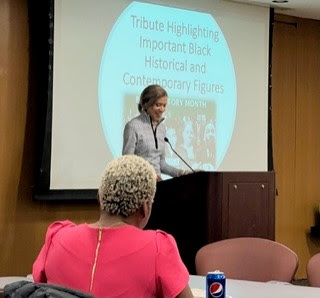Yesterday, we hosted our annual Black History Month celebration. This year’s theme was “Ubuntu: We Are Better Together.” I look forward to this great event every year, as we recognize the contributions that Black people have made across our society and within our own healthcare system.
As part of this year’s program, we featured the talents of our very own Wayman Scott, Associate Director of DEI and Community Relations. He is passionate about working with marginalized communities within Baltimore and is a gifted ceramic sculptor and artist. Click here to watch his inspirational story.
I also had the honor of introducing our keynote speaker – Faith Thomas, JD, Chair of our GBMCHealthCare Board of Directors. In addition to her innumerable professional accomplishments, Faith is an active volunteer and has been a tireless contributor to GBMC over the years. During her talk, Faith noted that although we tend to focus on historical “giants” during Black History Month, there are many who don’t often get recognized but are very much part of history as well.
She went on to share personal stories about how her own relatives shaped who she is today – from her love of reading and her general sense of curiosity to her interest in business and passion for volunteerism. She ended with a poignant message that her relatives didn’t do their work for the applause; they did it for the cause. They wanted to help their community and had the wherewithal to do so. As we think about the concept of Ubuntu, she implored us all to reflect on our own legacies and consider how we ourselves can influence the generations to come.
Lisa Walker, our Chief Diversity and Learning Officer, concluded the celebration with a similar sentiment, with hope that we would all leave inspired by history but look to the future and think of ways big and small that we might each individually support inclusivity. Thank you to Lisa, our Diversity and Inclusion Planning Committee, and our Marketing and Conference Center colleagues for helping to make this event a success.
Click here to view the full Black History Month program.
Thank a Resident Day
February 24 is designated “Thank A Resident Day,” so please take the time to thank our resident physicians for their hard work and dedication in helping us move toward our vision. Post-graduate training can be exhausting with long hours, increased responsibilities, and stress – I remember those days well. I am grateful to all our residents and Residency Program faculty!
Phlebotomists Recognition Week
Last week was National Phlebotomists Recognition Week. Phlebotomists play a crucial role in maintaining patient health and promoting lab efficiency and effectiveness. In addition to drawing blood, they ensure that we collect high quality specimens to allow our physicians to make accurate diagnoses. Thank you to our dedicated phlebotomists!





